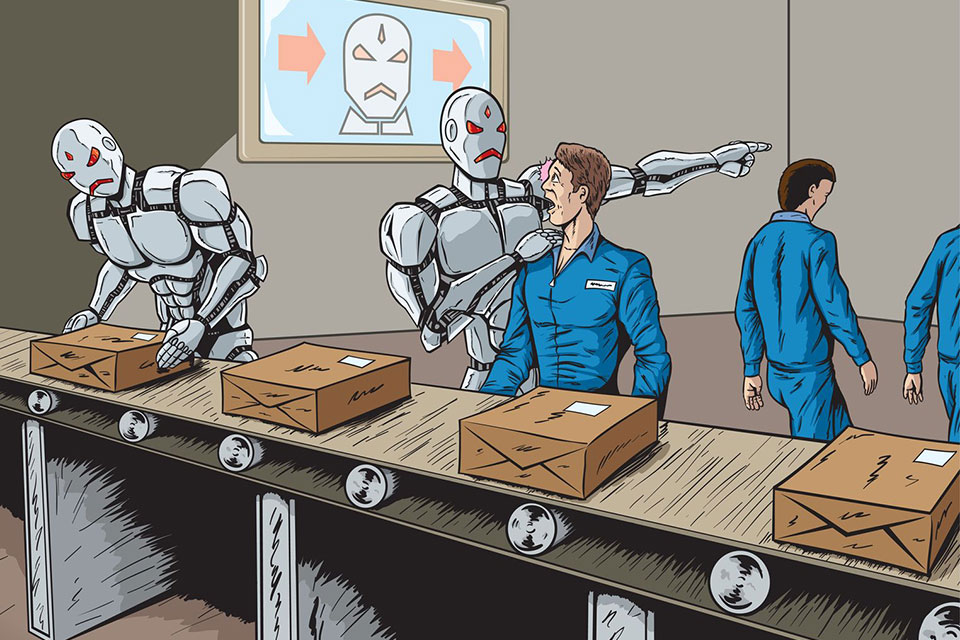
Despite an endless stream of stories in the media warning of humanity’s impending irrelevance in an automated future, it seems American workers remain rather blasé about the prospect of being automated out of existence in the workplace.
New research by Randstad US contradicts many reports that American workers fear losing their job due to automation.
The 2017 Randstad Employer Brand Research found that only 14 percent of US employees worry that automation will take their job away, and nearly one-third (30 per cent) say they think automation will make their job better.
Alongside their optimism toward automation, workers also report a willingness to retrain or upskill to maintain their current job status. In fact, the study found half of the respondents (51 per cent) agreed they would be happy to retrain if they were being paid the same or more than their current salary.
Linda Galipeau, CEO Randstad North America, says: “It is evident from our research that not only are workers not afraid of losing their jobs to automation, they are more than willing to retrain to leverage the efficiencies and benefits of artificial intelligence and robotics in the workplace.
“These sentiments should be welcome news for companies as they seek greater adoption of automation to drive productivity and innovation. As we have known for quite some time, the success of organizations in the future will depend greatly on their ability to strike a balance between valuable human insight and interaction with technology.
Galipeau continues: “In addition, it has become necessary for today’s employees and job seekers to continually cultivate, develop and update their skills to work successfully alongside AI and automation.
“In conjunction with retraining and upskilling efforts, workers should focus on growing unique human skills that AI and robots are unable to replicate, such as strategic and abstract thinking, complex communications, creativity and leadership competencies.”
US companies bullish about automation
Business leaders share the same beliefs as workers when it comes to the level of impact automation may have on the workforce.
Based on a survey of C-suite and human capital leaders, Randstad Sourceright’s 2017 Q2 Talent Trends survey finds that only 6 percent of US respondents believe increasing automation will have a significant impact on workforce planning and shifting the talent needed.
Meanwhile, US companies are enthusiastic about the potential benefits of automation and AI on their business, as evidenced by the following findings:
- A clear majority (84 per cent) of US respondents say they believe AI and robotics will have a positive impact on the workplace in the next three to five years.
- Forty-eight percent say automation/machine learning has either transformed or had a positive impact on their business in the past 12 months. Forty-five percent say the same of robotics.
- Seventy-four percent believe automation/machine learning will have sustained or greater influence on their business. Sixty-eight percent hold the same view about robotics.
- Perhaps due to these beliefs, 31 percent of employers said they have increased their usage of automation/robotics in their business in the past 12 months.
“The inescapable reality is automation and AI are here to stay, and will continue to grow substantially in the near future,” says Galipeau.
“As business leaders invest in digitization, automation, AI and other emerging technologies in the workplace, they must continue to evolve their workforce alongside these advancements. While the productivity and efficiency benefits of automation are unequivocal, the need for skilled humans to operate, utilize and advance technologies is equally unmistakable.
“And, we know that real connections aren’t made from algorithms or robots, they require human involvement and irreplaceable abilities such as empathy, communication, engagement, intuition and instinct.”
In an increasingly digital world, employers see the value of employees who demonstrate strong character and communication skills. To learn more, here are four ways to update soft skills in an automated workplace.
Other findings in the 2017 Randstad Employer Brand Research report include:
- Only 14 per cent of US employees worry that automation will take their job away (76 per cent of US workers do not fear automation).
- Nearly one-third (30 per cent) say they think automation will, in fact, make their job better.
- 51 per cent of employees would be happy to retrain or upskill to work with AI/automation, if it meant maintaining their current job status.

